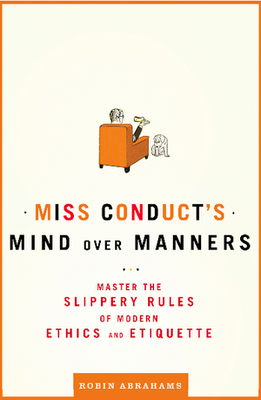Miss Conduct’s Mind Over Manners: Master the Slippery Rules of Modern Ethics and Etiquette

Miss Conduct is an exemplary advice columnist: quirky, direct, and practical. Her quirkiness throws her biases into the forefront, preventing any false pretense of neutrality, and allows her to emphasize a pleasant sense of humor. Her directness allows her to tackle thorny social issues with grace, and her pragmatism—born in part of her doctoral studies in human development and her conclusion that no one theory of human happiness is or could ever be definitive—makes her easy to trust, that last an essential yet often-overlooked quality in advice columnists.
These elements, in addition to Robin Abrahams’s wry sense of humor, make Miss Conduct’s Mind Over Manners an excellent read. I found myself laughing out loud at several portions of the book, notably when Abrahams claims early in her chapter on holidays that “asking an advice columnist her opinion of Christmas is kind of like asking an ER nurse her opinion of motorcycles. We never see the stories with a happy ending” and advises determined non-breeders that “[i]f you’re accused of selfishness for not wanting children, you can always ask why the accuser thinks it would be a good thing for selfish people to have children.” Her prose is straightforward without being stiff, conversational and well-crafted, and as a result the book goes down quickly and smoothly.
Naturally, Miss Conduct’s Mind Over Manners contains a few serious oversights, bothersome even when Abrahams seems aware of them. She demonstrates a live-and-let-live, pluralistic philosophy inherent to thought more left- than right-wing, but claims herself to be apolitical. She includes, for an advice columnist compiling a book, a startlingly small number of actual letters. She acknowledges that she “barely touched on homosexuality and transsexuals in the sex and gender chapter,” itself rather problematic, and fails even to mention bisexuality, one of the thornier issues of the contemporary dating scene (the treatment of which is my personal bugbear).
But to harp on such details is to miss the point of Miss Conduct’s book and philosophy. Abrahams encourages conversational partners to ‘take whatever topic you find boring up one level of abstractness,” and thus she defines her role as an advice columnist and author. Ours is to offer concrete examples of our specialized interests and situations; hers is to define generalized codes of conduct to be applied not only to our personal circumstances but also to those of other such demanding individuals. In this, Abrahams’s book succeeds in spades.